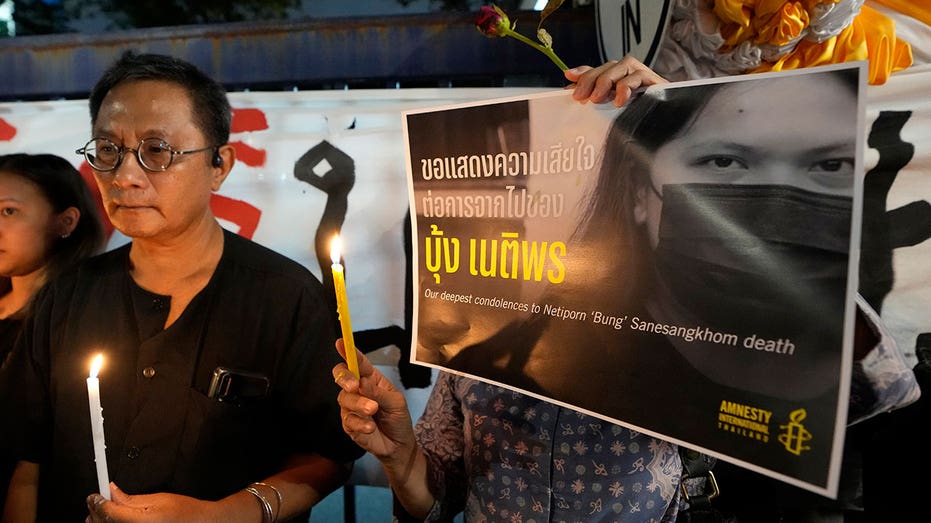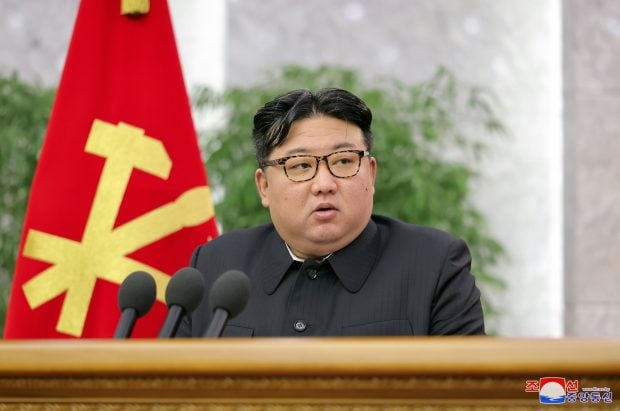A young Thai activist who went on a hunger strike after being jailed for advocating reform of the country’s system of monarchy died Tuesday in a prison hospital, officials said.
Netiporn Sanesangkhom, 28, was a member of the activist group Thaluwang, known for their bold and aggressive campaigns demanding reform of the monarchy and abolition of the law that makes it illegal to defame members of the royal family. The group’s name can be loosely translated to “breaking through the palace,” a reference to its open criticism of Thailand’s monarchy.
She appears to be the first political activist in Thailand to have died after carrying on a hunger strike.
THAILAND’S PRIME MINISTER MOVES TO OUTLAW MARIJUANA 2 YEARS AFTER ITS DECRIMINALIZATION
The royal institution until recent years was widely considered an untouchable, bedrock element of Thai nationalism. Criticism of the monarchy was taboo, and insulting or defaming key royal family members remains punishable by up to 15 years in prison under a lese majeste law, usually referred to as Article 112 of Thailand’s Criminal Code.
Student-led pro-democracy protests beginning in 2020 openly criticized the monarchy, leading to vigorous prosecutions under the law, which had previously been relatively rarely employed. Critics say the law is often wielded as a tool to quash political dissent.
The protest movement faded due to government harassment and the coronavirus pandemic, but Netiporn was one of more than 270 activists charged with Thailand’s royal defamation law since the protests in 2020-21.
Netiporn suffered cardiac arrest early Tuesday morning, and medical teams spent several hours trying to resuscitate her. She was pronounced dead just before noon, according to a press release from the Corrections Department..
She had two charges of lese majeste pending against her, both of them involving conducting polls in public spaces in 2022 asking people’s opinion about the royal family, according to the group Thai Lawyers for Human Rights. Her release on bail was revoked in January due to her participation in a political rally last year.
Netiporn started her hunger strike after she was detained in January. The Corrections Department said she started eating and drinking water again after April 4. However, the human rights lawyer group’s latest update on her condition on April 25 said she was still fasting.
Two fellow jailed activists are also carrying out hunger strikes. Both are Thaluwang’s monarchy reform activists slapped with lese majeste charges, and they started their hunger strike about a month after Netiporn.
Netiporn’s lawyers had applied to transfer her from the Central Corrections Hospital to Thammasat University Hospital but was never granted a prolonged stay there for treatment, said her lawyer Kritsadang Nutcharas.
“Does it seem like there’s standard treatment in the Thai justice system when we compare what these kids are going through with their political charges and what some prominent adults have gone through?” Kritsadang said. He was making an apparent reference to former Prime Minister Thaksin Shinawatra, who returned from exile last year to serve a prison term on corruption-related cases but never spent a single night in jail on grounds of ill health.
Thaluwang has made high-profile protests calling not only for reform of the monarchy, but also changes in the justice system and an end to political persecution through the courts. It has also called for rejection of Thailand’s application to join the U.N. Human Rights Council.
Thailand announced its bid for a seat on the U.N. Human Rights Council for the 2025-2027 term after the current government took office last year, seeking to show its commitment to protect human rights. Critics charge that the reality of law enforcement in the country strongly contradicts its ambition to be recognized by the international community as a human rights defender.
Human Rights Watch has raised concerns over “the Thai government’s use of arbitrary arrest and pretrial detention to punish critics of the monarchy for their views” which it says is a violation of their rights under international human rights law.





